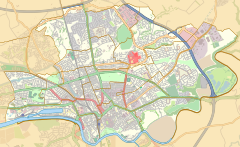Tulketh
 From Wikipedia the free encyclopedia
From Wikipedia the free encyclopedia
| Tulketh | |
|---|---|
 Ward location in the City of Preston district | |
Location within Lancashire | |
| Population | 7,380 (2011)[1] |
| District | |
| Ceremonial county | |
| Region | |
| Country | England |
| Sovereign state | United Kingdom |
| UK Parliament |
|
| Councillors |
|

Tulketh is an electoral ward in Preston, Lancashire, England. The Tulketh Mill is a notable landmark in the ward.[2]
Tulketh returns three members to Preston City Council, elected 'in thirds' in first past the post elections each year. The ward is currently represented by three Labour councillors.
The ward forms part of the Lancashire County Council electoral division of Preston Central South. Tulketh is commonly thought of as part of Ashton on Ribble.
Etymology
[edit]The name Tulketh is of Cumbric origin. The first element is tul meaning "hollow, hole, cave", while the second, -cę:d, means "woodland, forest" (corresponding to Welsh twll-coed). A common compound-formation in Welsh and Cornish toponymy, the name implies an appellative meaning of "broken woodland".[3][4][5]: 318
Current members
[edit]| Election | Member | Party | |
|---|---|---|---|
| 2007 Preston Council election | Robert Boswell | Labour | |
| 2008 Preston Council election | Matthew Brown | Labour | |
| 2010 Preston Council election | Peter Rankin | Labour | |
Demographics
[edit]From the 2001 census, Tulketh ward had a population of 6,886. Of this figure, just under three-quarters (74.5) described themselves as Christian. Over 10% of the population are retired, and just under 10% are students. Here is a 2011 ethnic breakdown of Tulketh.
| Tulketh 2011 Ethnic Groups | Tulketh | City of Preston |
|---|---|---|
| White British | 83.4% | 75.7% |
| Other White | 4.9% | 3.5% |
| Asian | 6.9% | 15.5% |
| Black | 1.1% | 1.2% |
Geography
[edit]The ward is in the northwest of Preston, taking in terraced streets and detached houses from outside the University of Central Lancashire campus to suburbia on both sides of the main Blackpool Road, and to the west of the A6 Garstang Road.
See also
[edit]References
[edit]- ^ "Tulketh - UK Census Data 2011".
- ^ "The story of Tulketh and Tulketh Hall". 14 March 2017.
- ^ James, Alan. "The Brittonic Language in the Old North - A Guide to the Place-Name Evidence" (PDF). Scottish Place Name Society. Retrieved 2 September 2020.
- ^ Padel, O. J. (2009). "Two Devonshire place-names" (PDF). Journal of the English Place-Name Society. 41: 119–26.
- ^ Coates, Richard; Breeze, Andrew (2000). Celtic Voices, English Places: Studies of the Celtic Impact on Place-Names in Britain. Stamford: Tyas. ISBN 1900289415..


